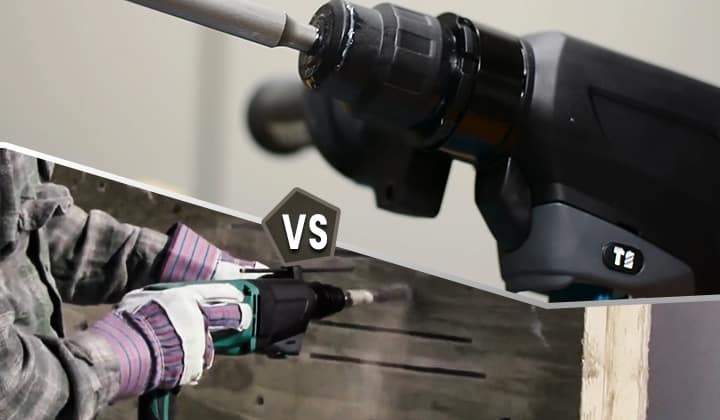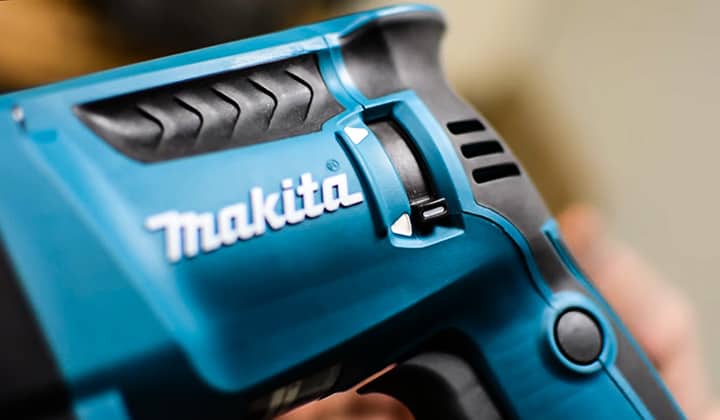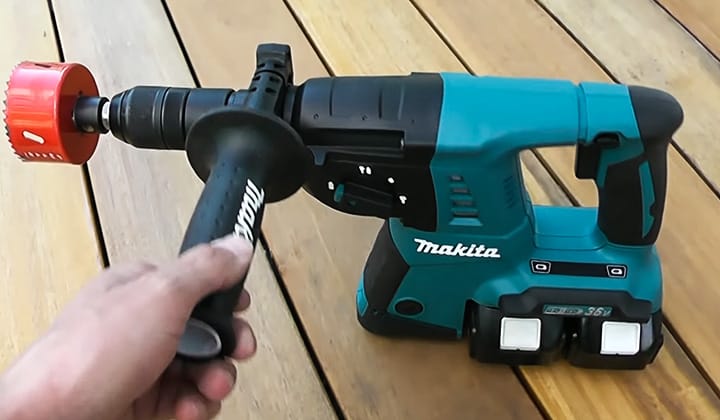Drills are a very common term in carpentry and masonry. They are a must-have in any worker’s arsenal. It provides its users with so much freedom and flexibility and saves plenty of valuable time. Their versatility is what makes them a vital asset to any carpenter, mason, or anyone who is involved in similar works.
Drills are tools used to make holes into wood, stone, concrete, or other hard materials. These holes are used for mounting screws, which, in turn, can also be done by drills. In addition, drills can also be used to unscrew screws that are stuck or corroded.
There is a wide variety of drills available in the market. Some of them include the hammer drill, rotary hammer, impact driver, screwdriver, etc. Each of them is different with respect to their size, power, and usage.

In this article, we are about to discuss two specific types of drills, the rotary hammer and hammer drill. Furthermore, we would make a rotary hammer vs. hammer drill comparison to give you a clear understanding and help you decide on which one you should get for yourself.
In this post we'll cover:
What is a Rotary Hammer?
The rotary hammer is a heavy-duty tool designed to carry out works like drilling through or chiseling hard materials. It is often compared to the hammer drill since they are both great for drilling through concrete. However, this type of device is bigger and heavier.
They come with a piston mechanism in place of a special clutch. And thus, they can create deeper drills much faster as the mechanism provides a powerful hammer blow to the back of the bit. Utilizing the “Electro-pneumatic” hammering mechanism, they are able to generate high power. Usually, rotary hammers are electrically powered.
Rotary hammers are almost always used for masonry as it can drilling through concrete walls quickly and efficiently. They can also be used to make dowels. You require a special kind of bit for a rotary hammer as any other bits will not be able to handle the unrelenting force of the machine.
Although rotary hammers are mainly used for construction, masonry, or other heavy works, especially drilling into concrete, their utility is not limited to just that. Other functions of this type of drill include breaking concrete or drilling through bricks or CMU blocks.
This tool is also used in demolition and digging. Even rock climbers find some use out of the rotary hammer; they use it for installing bolt and harnesses. Here are some advantages and disadvantages of using a rotary hammer.

Pros
- They are the ideal specimen for drilling into concrete and masonry.
- They can drill much deeper into robust materials at a shorter time.
- Rotary hammers are really durable and are preferred by many professional workers.
- These can also be used in demolition works.
- They are comfortable to use and doesn’t cause fatigue for a long time.
Cons
- Rotary hammers are powerful instruments; therefore, they are bulky and quite heavier than other drills.
- It demands a proprietary bit. Other bits won’t work with a rotary drill.
What is a Hammer Drill?
The hammer drill is a very common type of drill and is used by almost every worker. They are powerful drilling instruments, specifically designed to drill through hard surfaces like concrete or masonry. However, that is not their only use. These instruments are really handy and can be made use of by almost every person.
It uses a percussive mechanism. For this very mechanism, the drill performs successive bursts of hammer thrusts to drill through a material. That allows the machine to drill without needing much effort, making it ideal for drilling through concrete or other hard materials. With other types, it would take a lot hassle drilling through them.
Generally, hammer drills are pneumatic instruments. They can also be powered through gasoline or electricity. Gasoline or electrical forms of hammer drills are not very common these days.
A hammer drill is a versatile machine that can serve a lot of purpose besides drilling through concrete. It has a toggle that allows it to alternate between a hammer drill and a screwdriver or a conventional drill. With the flick of the toggle, you can essentially transform it into another tool.
Even though you can use hammer drills for light tasks as opposed to heavy jobs, they aren’t designed for them. These machines are big and heavy, which makes them harder to use for small screwdriver works. Other drills like the impact driver, screwdriver, or a traditional drill, can handle those tasks much better and cleaner than a hammer drill.
These tools can be a little expensive, but they deserve every penny. Hammer drills are very safe options when it comes to drilling through dense surfaces. Because of their utility and versatility, many people consider it as one of their first drivers. Some of its upsides and downsides are highlighted below.

Pros
- Ideal for drilling into hard surfaces like concrete. Other drills wouldn’t be able to easily penetrate these surfaces as easily as hammer drills can.
- This instrument is a must-have for construction and heavy-duty workers.
- It can fulfill the work of a screwdriver and some other drills. This relieves you of the trouble of getting another drill exclusively of those works.
- Good purchase even for the high price point.
Cons
- These drills are a little on the expensive side.
- They are tougher to handle due to their size and weight.
Rotary Hammer VS Hammer Drill
Both rotary hammer and hammer drills are great instruments. Despite their similarities, there are some major differences between them. We will now highlight those differences so that you know which one is the right choice for you.
- Rotary hammers are really powerful and can have great shock resistance. That makes it effective for drilling through heavy concrete or make large holes. Hammer drills, on the other hand, don’t pack much power when it is compared to a rotary hammer. Therefore, it is ideal for light concrete or masonry drilling up to a 3/8-inch diameter.
- Rotary hammers are the first choice of construction workers and professionals. Hammer drills, on the other hand, are more fitted under the hands of DIY-homeowners, amateurs, or handymen.
- The rotary hammer can drill holes from ¼-inch to 2-inch in diameter. On the other hand, hammer drills are capable of drilling from 3/16-to 7/8-inch diameter holes.
- Both the hammer drills share the same mechanism, the rotate-and-hammer action. But the rotary drill comes equipped with a piston mechanism, which makes it more powerful than its counterpart.
- Among the two instruments, the rotary hammer weighs more as it is more powerful and is bigger in size.
The above differences do not prove any instrument blatantly superior to the other. Each instrument is unique in its own aspect and is meant to deliver different uses. Your choice of tool ultimately depends on what you are trying to accomplish with it.
To put it bluntly, if you need something for heavy-duty tasks, a rotary hammer is your best friend. On the other hand, a hammer drill will give you a better experience working on lightweight projects.
Final Thoughts
Hammer drill and rotary hammer both are really essential instruments in a workers’ arsenal. They both serve different purposes and are respectable in their own fields.
A rotary hammer is more suited for heavy jobs due to their power. If you’re a construction worker or a professional, you would greatly benefit from having a rotary hammer in your kit. Hammer drills will give you more advantages if you are into light DIY works or carpentry.
We hope you find our articles on rotary hammer vs. hammer drill informative. You should now be able to decide which one better suits your purpose without any hassle.
I'm Joost Nusselder, the founder of Tools Doctor, content marketer, and dad. I love trying out new equipment, and together with my team I've been creating in-depth blog articles since 2016 to help loyal readers with tools & crafting tips.
